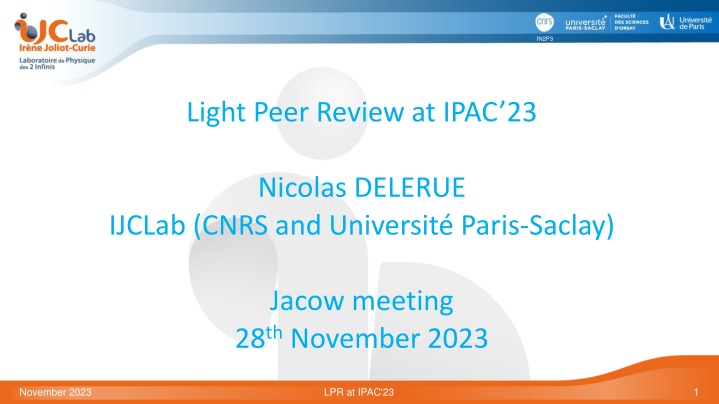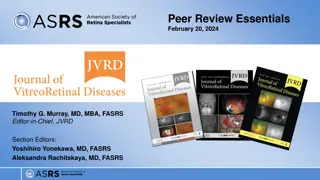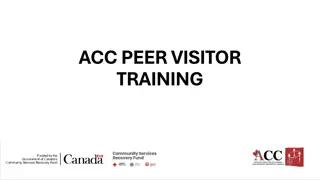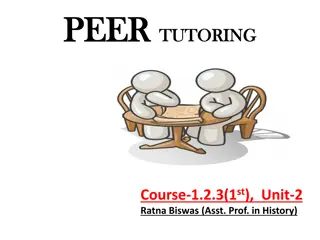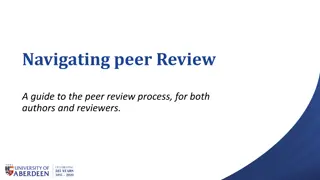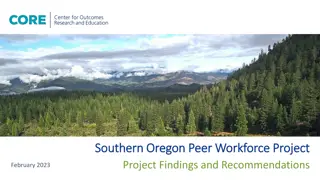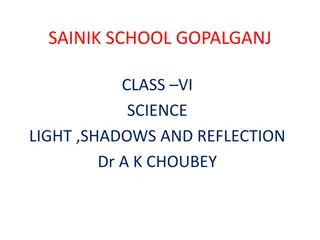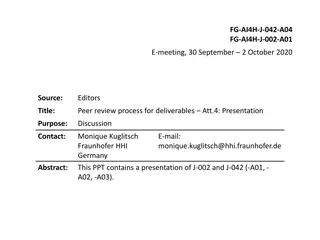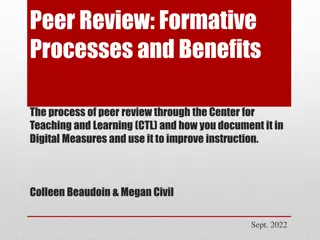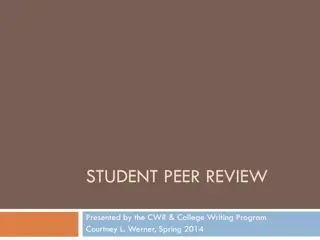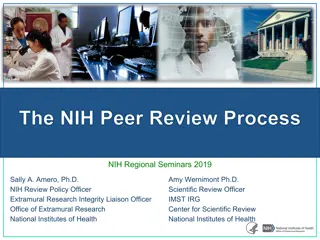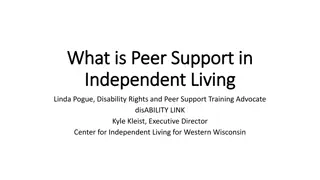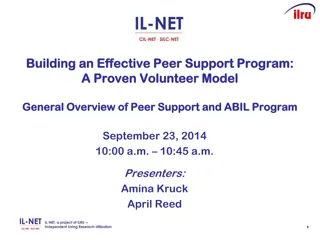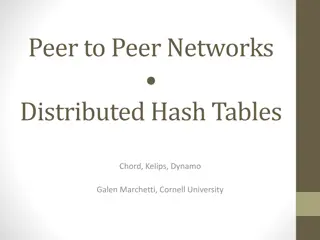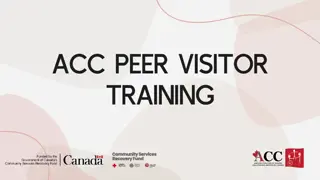Light Peer Review at IPAC'23 Organized by IN2P3: Details and Guidelines
Light Peer Review (LPR) at IPAC'23 organized by IN2P3 aims to enhance the academic reputation of accelerator research, train students in peer-review processes, and elevate the impact factor of publications. The event has strict acceptance criteria ensuring the quality and originality of the work, with detailed guidelines for reviewers to follow. The LPR is managed by the Scientific Publication Board (SPB) with specific policies in place for the review process.
Download Presentation

Please find below an Image/Link to download the presentation.
The content on the website is provided AS IS for your information and personal use only. It may not be sold, licensed, or shared on other websites without obtaining consent from the author.If you encounter any issues during the download, it is possible that the publisher has removed the file from their server.
You are allowed to download the files provided on this website for personal or commercial use, subject to the condition that they are used lawfully. All files are the property of their respective owners.
The content on the website is provided AS IS for your information and personal use only. It may not be sold, licensed, or shared on other websites without obtaining consent from the author.
E N D
Presentation Transcript
IN2P3 Light Peer Review at IPAC 23 Nicolas DELERUE IJCLab (CNRS and Universit Paris-Saclay) Jacow meeting 28thNovember 2023 November 2023 LPR at IPAC'23 1
Reminder Reminder: Light Peer : Light Peer Review Review at IPAC 23 at IPAC 23 IN2P3 Light Peer Review (LPR) motivations: Improve academic standing of accelerator research at Universities and strengthen the position of accelerator scientists in funding discussions and project applications. Train accelerator students and post-doc in the process of peer-reviewing publications. Boost the impact factor of PR-AB and other. LPR at IPAC 23: Deadline was set 6 weeks ahead of the conference to give more time to reviewers and to the peer-review process. Target of 250 papers. First LPR with indico SPMS code not available Code rewritten in Python (>6000 lines) To be added to Jacow Git repository (work in progress) November 2023 LPR at IPAC'23 2
Peer Review Acceptance Criteria (from IPAC20) Peer Review Acceptance Criteria (from IPAC 20) The published work must not contain clear errors or important factual mistakes. The paper must include own work, performed by the authors and not published elsewhere. Some aspect or part of the work must be original or demonstrate clear progress over other reports of the work. The presentation of the results must be understandable. The paper must be in good English. Work and related results by others must be referenced and properly acknowledged. The paper must include references to literature that are appropriate. Papers are considered not-correctable and therefore rejected in following cases: The whole Ansatz is wrong. The work is from somebody else or claiming authorship from somebody else. Requested changes are not implemented in time. November 2023 LPR at IPAC'23 3
Reminder: Peer Review General Policies for IPAC23 Reminder: Peer Review General Policies for IPAC 23 Papers will be rejected if a submission or correction deadline is missed. Papers are rejected if the review process is not completed by the end of the conference week. Each paper shall have two (2) reviewers. Single-blind review (where the reviewers are unknown to the authors). A reviewer shall not know the identity of the other reviewer assigned to the paper. A reviewer shall not contact an author directly concerning their paper. Reviewers shall not make any personal remarks, or comments that may betray their identity, when entering the instructions for requested correction/revision of the paper. Reviewers must not referee papers of which they are authors or co-authors. Only a single cycle of correction(s) by the author(s) is permitted; such cycle shall include the opportunity to respond to correction requests from both reviewers. Decisions of the SPB chief shall be final. November 2023 LPR at IPAC'23 4
LPR organization for IPAC23 LPR organization for IPAC 23 LPR is is managed by the Scientific Publication Board (SPB) The SPB acts much like the editorial board of a journal. SPB membership: has changed over years: The 16 SPC members + three regional chairs (present, past and future) [19 members] + SPC chair (new at IPAC 23) The present chair, or chief, is from the host region. The SPB chairs from the other two regions ensure continuity. SPB has administrative support from a person expert in the indico peer review module typically the scientific secretary. In the case of disputes, the present/active SPB chair s decision shall be final. November 2023 LPR at IPAC'23 5
IPAC23 SPB IPAC 23 SPB IN2P3 Scientific Publication Board (SPB): Previous rule for SPB membership was: current, past and future SPB chairs 8x2 MC coordinators 19 members SPC chair was not a member of SPB => added No SPB chair nominated for IPAC 24 Current SPB chair is also MC8 coordinator IPAC 23 SPB has 18 members Chairs: Frank Zimmerman (chair 22), Peter McIntosh (SPC chair) and Nicolas Delerue (SPB 23) MC1: Oliver Boine-Frankenheim, Jie Gao MC3: Victor Malka, Evgenya Simakov MC5: Sven Reiche, Seunghwan Shin MC7: Marie Helene Moscatello, Georg Hoffstaetter MC8: (ND) Sandra Biedron MC2: Sara Casalbuoni, Mark Boland MC4: Mohammad Eshraqi, Yoichi Sato MC6: Adriana Rossi, Jui-Che Huang November 2023 LPR at IPAC'23 6
LPR LPR evaluation evaluation process process Processing of a paper: Upon submission a paper is assigned to two referees (see later for paper/referee matching) asking them to review the paper within 10 days. Referees are asked to click on a form to confirm that they will review the paper Reminders are sent to referees if they do not confirm their acceptance or submit the paper by the deadline. Once the two reviews are received they are assessed by the Scientific Publication Board (SPB). Decision can be: Accept the paper as is Reject the paper (significant flaw that can t be corrected) Ask for corrections => 2ndround. In case of 2ndround the author is asked to correct the paper The same referees are asked to evaluate the paper in the second round. On the second round, the referees can only suggest to accept or reject the paper. Upon receiving the two reviews the SPB decides on the paper. November 2023 LPR at IPAC'23 7
Timeline Timeline Mid-march 2023: submission of papers began. [Saturday April 1st] IPAC-6 weeks: LPR Submission deadline => More than 100 papers submitted in the 48h before the deadline. All but 12 papers had a 1stround decision by the start of conference. All papers decided (2ndround) one week after the conference. Getting IoP guidance was difficult. Guidance sent to authors at the beginning of June. All papers in IoP format collected by mid-July. IoP submission platform is not user friendly but manageable. Then in the middle of the summer request from IoP for an additional document (Author Declaration Form). Collection started in September, completed end of October. Publication expected January 2024. November 2023 LPR at IPAC'23 8
LPR statistics LPR statistics IN2P3 288 papers submitted by the deadline + 4 accepted after with valid reasons (several others not accepted) => 292 papers processed. 2 papers rejected on editorial grounds (non compliant and not corrected). 1 paper significantly off-topic (HEP detector). 271 papers accepted at the end of the LPR process (93%). 1 paper had failed poster police but was able to explain why and apologised (accepted). 3 papers withdrawn in the month after the conference. 1 paper withdrawn when required to submit the Author Declaration form (ethical compliance). 267 papers should be published in January 2024 in the IPAC 23 Peer-reviewed proceedings (91%). 605 reviews on 1st round (2,09/paper) 273 reviews on 2nd round (1,1/paper) November 2023 LPR at IPAC'23 9
LPR statistics (continued) LPR statistics (continued) IN2P3 Papers submitters: Not registered by 23rdmarch 2023: 82 out of 284 Student 73 out of 202 (36%) Delegate Non-member EPS 113 (56%) Delegate EPS Member 14 (7%) Exhibitor extra pass 2 (1%) Papers with student as submitter or speaker or primary author: 52% Country of submitter: (out of 202 papers) China 18%, Germany 17%, Switzerland 15%, Japan 12%, United States 7%, Italy 9%, France 6%, Taiwan 5%; Other EMEA: 8%, Other Asia: 2%, Other America: 1% Region of submitter: EMEA 52%, Asia 32% , Americas: 16%. November 2023 LPR at IPAC'23 10
LPR statistics (continued) LPR statistics (continued) IN2P3 Papers by main classification: MC1: Colliders and other Particle Physics Accelerators: 38 (13%) MC1.A02 8 (3 %) Lepton Circular Colliders MC1.A24 7 (2 %) Accelerators and Storage Rings, Other MC1.A08 6 (2 %) Linear Accelerators MC2: Photon Sources and Electron Accelerators: 54 (19%) MC2.A06 12 (4 %) Free Electron Lasers MC2.T02 8 (3 %) Electron Sources MC2.A24 6 (2 %) Accelerators and Storage Rings, Other MC3: Novel Particle Sources and Acceleration Techniques: 11 (4%) MC4: Hadron Accelerators: 38 (13%) MC4.A08 10 (4 %) Linear Accelerators MC4.T12 9 (3 %) Beam Injection/Extraction and Transport MC5: Beam Dynamics and EM Fields: 38 (13%) MC5.D04 6 (2 %) Beam Coupling Impedance Theory, Simulations, Measurements, Code Developments MC5.D01 6 (2 %) Beam Optics Lattices, Correction Schemes, Transport MC6: Beam Instrumentation, Controls, Feedback and Operational Aspects: 38 (13%) MC6.T03: 17 (6%) T03 Beam Diagnostics and Instrumentation MC6.T04 8 (3 %) Accelerator/Storage Ring Control Systems MC7: Accelerator Technology and Sustainability: 51 (18%) MC7.T14 8 (3 %) Vacuum Technology MC7.T11 6 (2 %) Power Supplies MC8: Applications of Accelerators, Technology Transfer and Industrial Relations and Outreach: 16 (6%) MC8.U01 9 (3 %) Medical Applications Notes: several papers misclassified despite sorting work done ahead of SPC2! Should main classification and sub-classification be offered as separate menus in indico? November 2023 LPR at IPAC'23 11
Getting more reviewers Getting more reviewers IN2P3 Opt-in policy does not work: Some reviewer who volunteered at registration never replied to request or declined all assigned papers. Some participants who did not volunteer accepted to review and volunteered to review additional papers. Recommendation: use an opt-out policy (all participants may be queried to review and can decline). Review by students? Decision by IPAC 23 SPC1 was not to ask students to review papers. Identifying students requires access to the participants database => not data after 23rdmarch 2023 => participants registered after that date were not asked to review papers. 52% of the papers had a student as main contributor. In many cases the paper was submitted by a student whose professor did not attend the conference. One of the stated goals of the LPR is Train accelerator students and post-doc in the process of peer- reviewing publications. Shall we consider allowing one of the two reviewer to be a student on a trial basis (with opt-out possibility) at a future IPAC? Days between paper allocation and review submission Get faster reviews: 10 days to review was too much. One week is probably sufficient. November 2023 LPR at IPAC'23 12
LPR impact LPR impact IN2P3 Feedback (both by authors and by reviewers) was very positive. Some papers were significantly improved (spelling and/or scientifically). Several requests by students who needed to confirm the acceptance of the paper to graduate or thesis reviews. PR-AB: One of the stated aim of the LPR is to increase the impact factor of PR- AB and other journals in the community. Too early to measure. Difficult to ask reviewers to identify papers to be forwarded to PR-AB (quality vary a lot from reviewer to reviewer). Publication in LPR is not compatible with publication in PR-AB. November 2023 LPR at IPAC'23 13
How can How can Jacow Jacowhelp the LPR help the LPR IN2P3 Better unique identification of participants: Several participants used different spelling for their name as author, as volunteer reviewer or as participants (initial, space, middle name, ). This create confusion! Identify authors and conference participants by a unique id (SPMS database?). The same affiliation appeared with different spelling (CERN, Europeean Organization for Nuclear Research, C.E.R.N., ) Use a unique id for institutions (SPMS databse?). Papers compliance: Some papers were obviously non-compliant with Jacow proceedings rules. Require LPR to go through the CAT scan? Have a record of that validation. For better referee allocation: Allow queries through an API to the Jacow publication database to find someone s field of expertise (with a unique participant ID). November 2023 LPR at IPAC'23 14
Outlook Outlook LPR outcome: Increased paper quality Increase academic standing of our community 52% of the paper had a student as main contributor. Important for some thesis. LPR submissions come from all regions. Work was very intense during the 6 weeks prior to IPAC but also very interesting! November 2023 LPR at IPAC'23 15
Thank you November 2023 LPR at IPAC'23 16
Some issues to be considered for Future LPR Some issues to be considered for Future LPR IN2P3 Paper submission process: Papers using the Jacow format are significantly shorter (in pages) than those in the IoP format (typically 3 pages become 7 pages). Impossible to fit in 3 pages on the single-column IoP format (I tried hard). Once paper is approved, text can not be changed. Little leverage on the authors to have them try to reduce paper length. Once paper is approved in Jacow format, ask the author to resubmit immediately in IoP format. Add a space in indico for paper submission in IoP format and for submission of the author declaration form. Several papers were misclassified. Separate main classification and sub-classification as separate menus during submission? Make sure that SPC reclassification are taken into account (feedback to SPC and MC coordinators?). LOC mentioned that due to LPR they had to to assign poster codes very early however, LPR did not use poster codes but database code. To help LOC, do not ask for LPR papers to use poster codes. Policy: Some papers were rejected by more than 10 reviewers. Set a limit on the number of time a paper can be declined to be reviewed before a paper can be rejected as off-topic/misclassified . Some tracks have very small communities. Decide on a policy for papers with no reviewers available. Fetch reviewers from previous IPACs? Late publication date has some drawbacks for students. Consider cost benefit of publishing in January rather than July. Number of pages for LPR papers of invited orals? 3? 5? November 2023 LPR at IPAC'23 17
Some issues to be considered (contd) Some issues to be considered (cont d) IN2P3 Peer review process: Find a space in the cloud to share data on reviewers/papers matching. This would allow several persons to assign reviewers to papers. In the review form, separate scientific comments from spelling comments (a long list of spelling mistakes does not require a review on the second round). Indico: Several reviewers posted comments visible by authors and some comments disclosed their identity. Disable comments on papers Some SPB members mistakenly validated (judged) papers without waiting for approval from the others. This created some confusion. Create an observer status that can access to all reviewers comments but not judge the paper. Some LOC members has large rights on indico and judged paper for which they were only reviewers. No way to prevent reviewers to mark papers to be corrected on second round. Limit the number of rounds in indico? Withdrawn papers completely disappear from Indico. Keep a record of papers even when withdrawn. November 2023 LPR at IPAC'23 18
Some issues to be considered (contd) Some issues to be considered (cont d) IN2P3 Jacow: Several participants used different spelling for their name as author, as volunteer reviewer or as participants (initial, space, middle name, ). This create confusion! Identify authors and conference participants by a unique id (SPMS database?). The same affiliation appeared with different spelling (CERN, Europeean Organization for Nuclear Research, C.E.R.N., ) Use a unique id for institutions (SPMS databse?). Allow queries through an API to the Jacow publication database to find someone s field of expertise. Some papers were obviously non-compliant with Jacow proceedings rules. Require LPR to go through the CAT scan? Have a record of that validation. Scripts/code: Ensure code is transmitted from one year to the next. Find a space to share the scripts managing the LPR. At the moment most of the scripts (except email functions) are on gitlab at https://gitlab.in2p3.fr/delerue/ipac-lpr LOC / IoP contract: Ensure that the contract specifies that the IoP must transmit indexed data to Clarivate November 2023 LPR at IPAC'23 19
Reviewers Reviewers allocations allocations IN2P3 Final algorithm: Search for all speakers, authors and co-authors in a given track (subMC) (including people who did not volunteer as reviewer) Limitation to 3 papers for volunteers, 1 for non volunteer; upon review completion, ask if volunteer for more papers If no match in the other continents, look for reviewers in the same continent but different country. If less than 5 reviewers, look for additional reviewers in same sub- classification in other MC. If no reviewer found, look manually in related technologies (other tracks). November 2023 LPR at IPAC'23 20
Reviewers Reviewers statistics statistics IN2P3 LPR activity started around 15thMarch (thanks to an email from a colleague who wanted me to check that his paper had been received). Peak activity the week after April 1st(more than 400 assignation/week). Before 15thApril, feedback: IPAC still far in the future. After 15thApril: busy preparing their own IPAC paper/poster. Easter long week-end, easter vacation, Most reviewer accepted to review within a few days (week-ends not implemented in code). Most reviews within the 10 days deadline for review. Time allocated to review the paper should be modulated as function of time remaining to IPAC (no time to implement it in code). Proposal: 10 days before the LPR deadline, 7 days after, -1 days each week. Reviewers acceptance: Some reviewer who volunteered at registration never replied to request or declined all assigned papers. Some participants who did not volunteer accepted and volunteered to review additional papers. November 2023 LPR at IPAC'23 21
Submission Submission time of LPR time of LPR papers papers November 2023 LPR at IPAC'23 22
